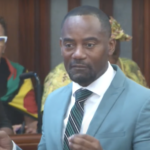Happy New Year! I wish the Barbados TODAY team, loyal readers and all of Barbados a safe, productive and fulfilling 2025, as all of us strive to make our lives and our nation live up to the potential sacrificed for and provided by our forefathers.
The new school term will start next week, and, as I pondered the pain of the return to that rush-hour traffic (if only we had adequate public transport for school children), it occurred to me that, similar to New Year’s resolutions for our personal lives, it is equally important to consider a New Year ‘Wish List’ for our education system and the flesh-and-blood children who spend their lives from ages three to 18 in that system.
I started such a wish list: Grantley Adams Memorial School students returning to in-person education, immediate: enhanced proactive communication with the public; enhanced quality assurance in exam papers and marking, stakeholder engagement of, and accountability to, particularly that of parents, by CXC; enhanced funding for remedial education in primary and secondary schools; additional resources for mental health support of students, etc. I will address that New Year’s wish list in a subsequent column.
But you know what: all of those concerns and initiatives, as important as they are, are like ‘sand going through the hourglass’ if health and security challenges at school remain deeply problematic. We recall the commencement of the academic school year last September and the almost daily/ weekly violent incidents involving school children. And those were the ones that the public heard about.
Frankly, the issue of national crime and violence is top of mind for me and should be top of mind for all Barbadian citizens and residents. Of course, one doesn’t wish to be gratuitously alarmist, and we are conscious of the impact of ‘bad PR’ on our currently bumper tourism season, but frankly, given that people have taken to the street to protest issues with far less national import, I’m surprised at the relatively muted national response to the November 2024 official revelations of the crime statistics involving school-age teen children and very young adults.
Criminologist in the Attorney General’s Office, Kim Ramsay, revealed that the age of offenders was “significantly decreasing”, with many individuals between 11 and 15 years old being charged with serious offences such as murder and robbery. She noted that 16-year-olds were also committing murder and that increasingly, young people were victims of violent crimes as well.
Cheryl Willoughby, the director of the Criminal Justice Research and Planning Unit, also indicated in November that the average age of people accused of murder over the past six months was 17 to 18. UN child rights expert Faith Marshall- Harris said Barbados needed an urgent and major intervention to address the rise in organised crime, which had seen an increase in the recruitment of children. Marshall-Harris said there is a worrying trend of gang leaders targeting younger recruits to smuggle drugs, transport guns, and even commit murder.
In October 2024, President of the Barbados Union of Teachers Rudy Lovell indicated: “In recent months, the rise in violence within our schools has reached a critical tipping point. . . . These are not isolated incidents but indicators of a deep-rooted crisis in our educational system . . . . The escalating violence cannot be ignored, and it demands immediate and decisive action.”The foregoing led the Barbados TODAY editorial of October 2024 to conclude: “The school system appears to be under siege.”
We support and welcome the impressive suite of strategies which various government ministries, in conjunction with community-based organisations and NGOs, have unveiled over the past year, to address the root causes of behavioural dysfunction, including that in our schools: – Draft National School Security and Safety Policy announced in November 2024, by the Minister of Education, inclusive of more social workers; – Ministry of People Empowerment and Elder Affairs: a new parenting programme with PAREDOS, more psychologists, expanding mental health support; – Literacy Task Force launched, to be followed by a Numeracy Task Force; – 21st-century modern best practice child justice and child Protection legislation; – Draft National Crime Prevention Plan – youth focus; – 2023 One Family Programme in the Ministry of People Empowerment, for 2 000 of the island’s most vulnerable families.
However, as the BUT indicated there is a ‘need for clear timelines for implementation, to ensure accountability, transparency and proactive stakeholder consultation.’ It was noted that similar school safety measures were promised five years ago. Additionally, most of these valuable strategies have long-term horizons. Certain key ones were reported as only at the draft stage, and thus presumably not yet funded nor fully implemented(?). If the school security challenge is at the crisis level which the experts above have indicated, surely that requires an immediate short-term response, including the emergency injection of the requisite funds required for implementation?
While we recognise that behaviours at school are a reflection of a complex national interplay of family dysfunction, community crime, and socio-economic and cultural challenges, that does not remove the responsibility from the Ministry of Education and the government to deploy and implement within the school system a range of proactive data-driven responses, guided by consultation with education stakeholders and specialist expertise, with short-, medium- and long-term timelines to address what the experts have indicated is a national crisis confronting us and impacting our schools.
The BUT has indicated that approximately 20 out of the island’s 68 public primary schools do not have a dedicated security presence. What are the stats for secondary schools? One security guard at the gate for a 1 000-student school is woefully inadequate. Security experts have also noted that a schoolby-school review of specific security needs and immediate implementation of solutions tailored to those school-specific needs are crucial elements to an enhanced school security strategy responding to the current situation.
The relevant ministry, or Cabinet, could also announce enhanced measures to hold parents more accountable for the disruptive behaviour of their children. While some parents do need additional support, far too many parents engage in lazy parenting and are absent from their parental responsibility. The Minister of Education recently identified 300 students in the school system with profoundly problematic behaviours. Some educators say the number is far greater.
Both the BUT and BSTU have called for the re-establishment of a residential facility, in accordance with best practice standards, not as a ‘junior Dodds’, but a place where these students can be removed from the school environment, and from their community and/or home environments which are often problematic, obtain counselling and therapy, remedial education and job-skills training. In a perfect world, parental counselling would also be part of such a programme.
How quickly could such a facility be implemented? There is also the challenge of pervasive gang-like bullying intimidatory behaviour which persists in too many schools, despite current anti-bullying policies. Clearly those policies need review and revamping, so students feel comfortable in reporting such bullying. Children, teachers and other staff have a right and expectation to feel safe at school. No one can teach effectively, few can learn optimally, in a dysfunctional, disruptive school environment.
Prime Minister Dr Keith Rowley of Trinidad and Tobago in 2023 noted that the “secondary school system is breeding uneducated gang members” (T&T Guardian) during the April 2023 CARICOM Heads of Government Regional Symposium addressing crime and violence as a public health Issue. The current state of emergency in Trinidad and Tobago should be an alarming and cautionary tale for us all.
We look forward to a proactive announcement from the Ministry of Education on new enhanced security measures at the start of this academic term. Again, parents, students and teachers at Grantley Adams Memorial School, and the nation, also need urgent updates on the status quo there. Those students effectively lost an entire term to online teaching, which few students can afford.
Paula-Anne Moore is the spokesperson and coordinator of the Group of Concerned Parents of Barbados and Caribbean Coalition for Exam Redress.
The post #BTColumn – School safety crisis: A New Year’s call to action appeared first on Barbados Today.


